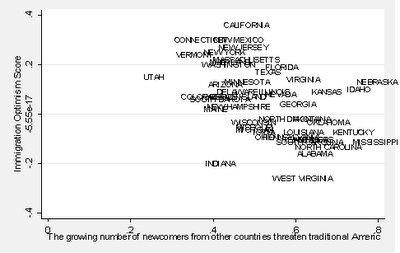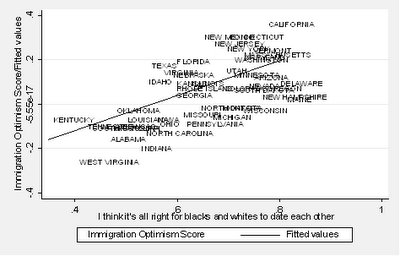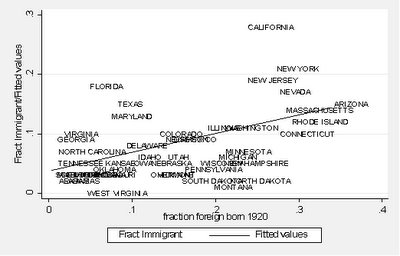Friday, May 19, 2006
Beliefs About Immigration
Bryan Caplan posts an interesting analysis of the relationship between the prevalence of immigrants within states and fears about immigrants stealing American jobs. Using data from SurveyUSA, he notes that states with more immigrants are less afraid of immigrants stealing jobs (even after only including natives in the sample). I've reproduced his primary figure below (adding state name labels).
Figure 1

Caplan interprets his results to suggest, "that people who rarely see an immigrant can easily scapegoat them for everything wrong in the world. Personal experience doesn't get in the way of fantasy. But people who actually see immigrants have trouble escaping the fact that immigrants do hard, dirty jobs that few Americans want - at a realistic wage, anyway."
It should be noted, however, that people who fear immigrants taking American jobs also believe that immigrants threaten "traditional American values" (see Senate passing English as national language, uproar over a Spanish version of the national anthem, ...). Using the combined PEW Values Survey (1987-2003) and aggregating respondents by state, I document a strong correlation between the fraction of respondents who agree with the statement "newcomers from other countries threaten traditional American values" and the fraction that think immigrants "steal" American jobs in Figure 2.
Figure 2

The second figure suggests that one could modify Caplan's argument to say that people who interact with immigrants are also less likely to think that they threaten traditional American values.
I agree with much of this description. It is consistent with the findings of the roommates paper we discussed earlier (being randomly assigned to a roommate from a different background increases your sympathy toward that group). And with the story Ed Glaeser and I advocate in the "Myths and Realities" paper that interactions with immigrants in the marketplace (or factory) produced liberal cultural attitudes on the coasts.
However, I think it is important to note that other variables might drive the correlation. Caplan argues that their is a causal effect of exposure to immigrants on tolerance of them. While I think that there is reason to believe such an effect exists, I am not sure that the relationship is as strong as the above figures suggest.
There are other explanations that could easily explain the observed relationship. E.g., immigrants may (randomly or rationally) choose to live in areas that are populated with people who are likely to tolerate them (or people who are predisposed to tolerate them might be more inclined to live near them). Indeed, there is a strong correlation between the immigration optimism score, the current fraction of the population that are immigrants, and other "liberal" attitudes towards minorities. Figures 3 and 4 show the strong correlation between the immigration optimism score and beliefs that it is ok for blacks and whites to date each other, and the correlation between the fraction immigrant and the belief that schools should have the right to fire homosexual teachers (data also from combined PEW Values Survey).
Figure 3

Figure 4

Further, immigrants tend to locate in places which have typically been attractive to immigrants (which as discussed in the Myths and Realities paper also correlates with liberal beliefs).
Figure 5

Thus, at least some of the observed relationship between current immigration and tolerance of immigrants is endogenous (or driven by omitted variables). Ultimately, more work needs to be done to deepen our understanding of the relationship between immigration, diversity, and tolerance. It seems clear that there is some sort of a relationship, but how big and how it operates needs more study. To better understand the causal effect of immigration on tolerance, I would be curious to see how views of immigrants, etc. changed after an immigration shock like the Mariel boat lift.
Figure 1

Caplan interprets his results to suggest, "that people who rarely see an immigrant can easily scapegoat them for everything wrong in the world. Personal experience doesn't get in the way of fantasy. But people who actually see immigrants have trouble escaping the fact that immigrants do hard, dirty jobs that few Americans want - at a realistic wage, anyway."
It should be noted, however, that people who fear immigrants taking American jobs also believe that immigrants threaten "traditional American values" (see Senate passing English as national language, uproar over a Spanish version of the national anthem, ...). Using the combined PEW Values Survey (1987-2003) and aggregating respondents by state, I document a strong correlation between the fraction of respondents who agree with the statement "newcomers from other countries threaten traditional American values" and the fraction that think immigrants "steal" American jobs in Figure 2.
Figure 2

The second figure suggests that one could modify Caplan's argument to say that people who interact with immigrants are also less likely to think that they threaten traditional American values.
I agree with much of this description. It is consistent with the findings of the roommates paper we discussed earlier (being randomly assigned to a roommate from a different background increases your sympathy toward that group). And with the story Ed Glaeser and I advocate in the "Myths and Realities" paper that interactions with immigrants in the marketplace (or factory) produced liberal cultural attitudes on the coasts.
However, I think it is important to note that other variables might drive the correlation. Caplan argues that their is a causal effect of exposure to immigrants on tolerance of them. While I think that there is reason to believe such an effect exists, I am not sure that the relationship is as strong as the above figures suggest.
There are other explanations that could easily explain the observed relationship. E.g., immigrants may (randomly or rationally) choose to live in areas that are populated with people who are likely to tolerate them (or people who are predisposed to tolerate them might be more inclined to live near them). Indeed, there is a strong correlation between the immigration optimism score, the current fraction of the population that are immigrants, and other "liberal" attitudes towards minorities. Figures 3 and 4 show the strong correlation between the immigration optimism score and beliefs that it is ok for blacks and whites to date each other, and the correlation between the fraction immigrant and the belief that schools should have the right to fire homosexual teachers (data also from combined PEW Values Survey).
Figure 3

Figure 4

Further, immigrants tend to locate in places which have typically been attractive to immigrants (which as discussed in the Myths and Realities paper also correlates with liberal beliefs).
Figure 5

Thus, at least some of the observed relationship between current immigration and tolerance of immigrants is endogenous (or driven by omitted variables). Ultimately, more work needs to be done to deepen our understanding of the relationship between immigration, diversity, and tolerance. It seems clear that there is some sort of a relationship, but how big and how it operates needs more study. To better understand the causal effect of immigration on tolerance, I would be curious to see how views of immigrants, etc. changed after an immigration shock like the Mariel boat lift.
Subscribe to Comments [Atom]